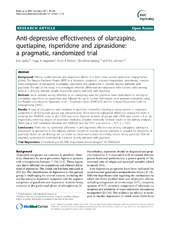| dc.contributor.author | Kjelby, Eirik | |
| dc.contributor.author | Jørgensen, Hugo A. | |
| dc.contributor.author | Kroken, Rune A. | |
| dc.contributor.author | Løberg, Else-Marie | |
| dc.contributor.author | Johnsen, Erik | |
| dc.date.accessioned | 2012-01-23T10:05:18Z | |
| dc.date.available | 2012-01-23T10:05:18Z | |
| dc.date.issued | 2011-08-31 | eng |
| dc.Published | BMC Psychiatry 2011, 11:145 | en |
| dc.identifier.issn | 1471-244X | |
| dc.identifier.uri | https://hdl.handle.net/1956/5489 | |
| dc.description.abstract | Background: Efficacy studies indicate anti-depressive effects of at least some second generation antipsychotics (SGAs). The Bergen Psychosis Project (BPP) is a 24-month, pragmatic, industry-independent, randomized, head-tohead comparison of olanzapine, quetiapine, risperidone and ziprasidone in patients acutely admitted with psychosis. The aim of the study is to investigate whether differential anti-depressive effectiveness exists among SGAs in a clinically relevant sample of patients acutely admitted with psychosis. Methods: Adult patients acutely admitted to an emergency ward for psychosis were randomized to olanzapine, quetiapine, risperidone or ziprasidone and followed for up to 2 years. Participants were assessed repeatedly using the Positive and Negative Syndrome Scale - Depression factor (PANSS-D) and the Calgary Depression Scale for Schizophrenia (CDSS). Results: A total of 226 patients were included. A significant time-effect showing a steady decline in depressive symptoms in all medication groups was demonstrated. There were no substantial differences among the SGAs in reducing the PANSS-D score or the CDSS sum score. Separate analyses of groups with CDSS sum scores > 6 or ≤6, respectively, reflecting degree of depressive morbidity, revealed essentially identical results to the primary analyses. There was a high correlation between the PANSS-D and the CDSS sum score (r = 0.77; p < 0.01). Conclusions: There was no substantial difference in anti-depressive effectiveness among olanzapine, quetiapine, risperidone or ziprasidone in this clinically relevant sample of patients acutely admitted to hospital for symptoms of psychosis. Based on our findings we can make no recommendations concerning choice of any particular SGA for targeting symptoms of depression in a patient acutely admitted with psychosis. | en_US |
| dc.language.iso | eng | eng |
| dc.publisher | BioMed Central | eng |
| dc.rights | Attribution CC BY | eng |
| dc.rights.uri | http://creativecommons.org/licenses/by/2.0/ | eng |
| dc.title | Anti-depressive effectiveness of olanzapine, quetiapine, risperidone and ziprasidone: a pragmatic, randomized trial | eng |
| dc.type | Peer reviewed | |
| dc.type | Journal article | |
| dc.description.version | publishedVersion | |
| dc.rights.holder | Copyright 2011 Kjelby et al; licensee BioMed Central Ltd. | |
| dc.identifier.doi | https://doi.org/10.1186/1471-244x-11-145 | |
| dc.identifier.cristin | 869642 | |
| dc.subject.nsi | VDP::Medical disciplines: 700::Basic medical, dental and veterinary science disciplines: 710::Pharmacology: 728 | eng |
| dc.subject.nsi | VDP::Social science: 200::Psychology: 260 | eng |

